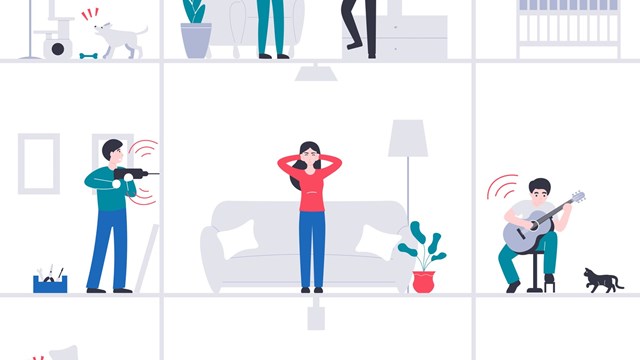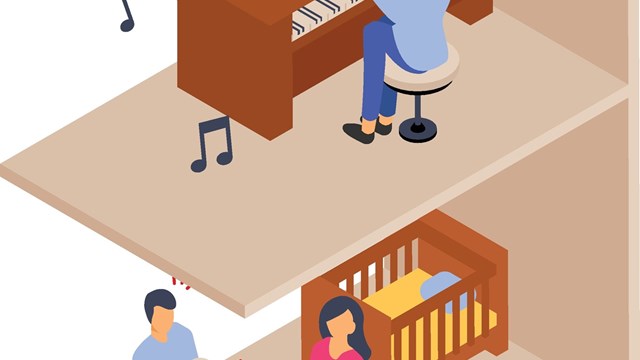Noise is an acknowledged part of urban life - particularly apartment living. Some of it - traffic, garbage collection, people shouting on the street - is external, and is controlled (theoretically, anyway) by zoning laws and noise ordinances. Some noise is internal however, and may be coming from upstairs, downstairs, or from the building next door. But even with the understanding that city living comes with a certain amount of racket, how much noise is simply too much - and what can you as a shareholder or a unit owner do about it? The answer is...it depends.
What's 'Normal'?
Deborah Koplovitz, a partner at the New York-based law firm Herrick Feinstein notes that “With noise issues, we get into the world of subjectivity. One person may tolerate a concert pianist practicing the same phrase over and over all day, but for someone else, that may drive them bonkers.” The sound of people walking on the floor above you “is normal,” Koplovitz stresses, “but someone may perceive it as something other than that and say it’s intentional. Minds can get lost.”
By the same token, dropping something on the floor at 3 AM every night may not seem troublesome to the person doing it; the act may not be intentional, but it’s also not normal - especially if it wakes their downstairs neighbor nightly. In that case, the noise becomes inconsiderate and unacceptable.
As an attorney for community associations, Michael C. Kim, of counsel to the law firm of Schoenberg Finkel Beederman Bell Glazer in Chicago has faced this problem many times. “These are the most frustrating situations for both the unit owner and associations,” he says. “Often it is addressed as a nuisance behavior. One person is creating an unreasonable situation and interfering with another person's legitimate use and enjoyment of [their home]. It’s difficult to establish the nuisance as noise - and sensitivity to noise is somewhat subjective. Some people are more acute and sensitive to disturbances than others, from whatever source.”
What to Do?
If you’re the one suffering through a difficult noise relationship with your neighbor, what should you do? The options available to you might depend on where you live. Attorneys in Chicago suggest you have a friendly conversation with your neighbor first. Explain to them what’s happening on your side of the common divide and try to work out a solution that’s amenable to both of you. “The common expectation is that neighbors will talk to each other civilly,” says Kim.
By contrast, attorneys in New York suggest you bypass the personal approach and go directly to the managing agent. According to Koplovitz, “The first thing to do is reach out to your managing agent. Make sure you document the noise, the time it occurs, elements and characteristics of the noise, etc.” - the managing agent will need that information when he/she speaks with your neighbor. “Co-ops generally have an 80% rule with regard to floor coverings” - meaning that 80% of the floors in a unit must be covered with carpet or rugs to absorb sound - “and all shareholders have to abide by it. The managing agent may do inspection of the apartment to make sure it’s in compliance.”
There are limits to ‘Midwest Nice,’ however. Kris Kasten, another Chicago-based community association attorney notes that, “While I do favor the neighborly approach, some owners who are being bothered by noisy neighbors may not want to approach the person causing the noise due to a perceived [threat of] retribution. They may be fearful of the neighbor - especially if the situation is already tense.” If speaking with the noisy party is viable, and fails to remedy the problem, “In almost every situation, the owner should next complain to the association,” he says. “Register it with management and the association board, and ask them to stop the noise. Most condos and co-ops have rules - nuisance provisions - that address noise problems, and if there are rules, they must be followed.”
What Says the Board?
Once the managing agent has entered the picture, the board will be informed of the problem - and in some cases, explains Kim, may choose to get involved. They may hear the complaint, determine whether under the building or association house rules there is a problem, and come to some determination of action against the offending party. That action might range from mandating the installation of some kind of soundproofing, or perhaps even leveling a fine.
Regardless, if it’s determined that there is a nuisance, that nuisance must be addressed. According to Mark Hakim, an attorney with the firm Schwartz Sladkus Reich Greenberg Atlas in New York City, “The board has a fiduciary responsibility to investigate, and promptly attend to all complaints and determine the validity thereof. In the event a board doesn’t act promptly or properly, the shareholder can bring an action against them, based on that shareholder’s inability to use their apartment in the manner intended.”
In the event the board refuses to intervene and the nuisance continues, the complaining party can take matters into their own hands. Not only can they sue the offending neighbor, but if they feel the board has shirked its responsibility in upholding quality of life in the building - and that responsibility is clearly delineated in the governing documents of pretty much every multifamily community - the complainant can sue the board as well. If it’s determined that the board was unresponsive to the point of negligence, the board as a body, as well as individual board members, may be on the hook for damages.
Condo vs. Co-op
As usual, the differences and distinctions between condo and co-op ownership figure into how noise disputes are adjudicated in each. In this particular case, co-ops have more sway over the behavior of their shareholders than condos or HOAs do. Technically, since a co-op shareholder is a resident under a proprietary lease (rather than a deed-holding owner of real property, as is the case in a condo), and since the co-op guarantees the right of quiet enjoyment under the Habitability clause in that lease, the complaining shareholder could force the board’s hand to ultimately evict the offending shareholder for his or her actions.
In a condominium, the actions left to the board are less direct. They would have to obtain a cease-and-desist order - but according to the attorneys CooperatorNews spoke with, condominiums are increasingly enacting house rules more similar to co-ops than in the past to effectively deal with these issues.
Fundamentally, whether co-op or condo, an apartment is a home - and a home is intended to be a place of rest and tranquility to be enjoyed by its occupant. Be cognizant of your neighbors and the noise you make. Hopefully, they will do the same.










Comments
Leave a Comment